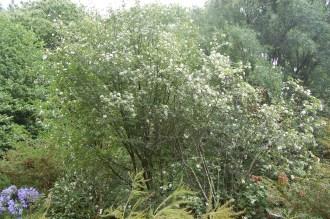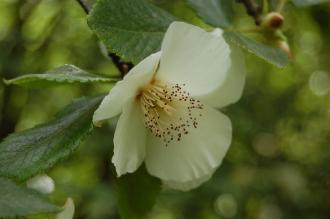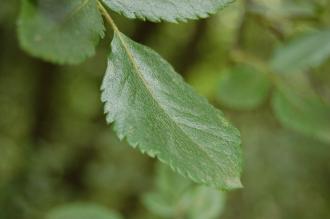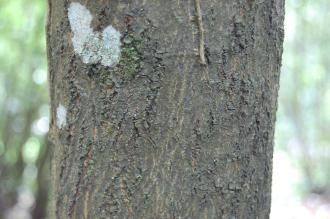
Eucryphia glutinosa (28/07/2014, Botanique National de Brest, France)
Position: Full sun to partial shade
Flowering period: Summer
Soil: Moist, well drained
Eventual Height: 10m
Eventual Spread: 6m
Hardiness: 8a, 8b, 9a, 9b, 10a, 10b
Family: Cunoniaceae

Eucryphia glutinosa Flower (28/07/2014, Botanique National de Brest, France)
Eucryphia glutinosa is a large deciduous shrub or small tree with an upright habit. Its glossy dark green leaves are odd pinnate and up to 6cm long. Its leaflets are elliptic with serrate margins. Its leaves turn orange/ red in autumn before they fall. Its fragrant white flowers are four petaled and up to 6cm across.
Eucryphia glutinosa, commonly known as Brush Bush or Nirrhe, is native to Chile. In its native habitat it grows in moist woodland habitats.

Eucryphia glutinosa Leaf (28/07/2014, Botanique National de Brest, France)
The etymological root of the binomial name Eucryphia is from the Greek eu meaning ‘well’ and krufaios meaning ‘hidden’. Glutinosa is derived from the Latin glutino meaning ’sticky’.
The landscape architect may find Eucryphia glutinosa useful as a late flowering upright small tree suitable for acidic soils. Its roots should be shaded from the sun.

Eucryphia glutinosa Bark (28/07/2014, Botanique National de Brest, France)
Ecologically, Eucryphia glutinosa flowers are attractive to pollinating insects.
Eucryphia glutinosa prefers moist, fertile, well-drained soils. It prefers a neutral to acid pH of soil. It dislikes dry soils. It dislikes root disturbance.
Eucryphia glutinosa requires little maintenance.

